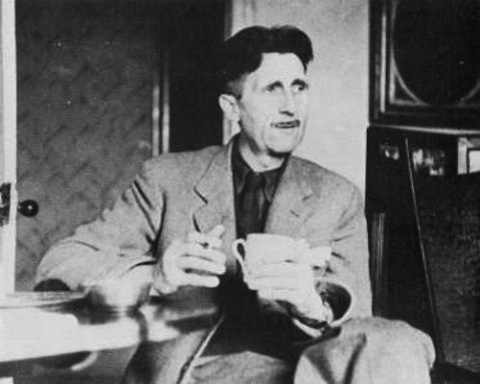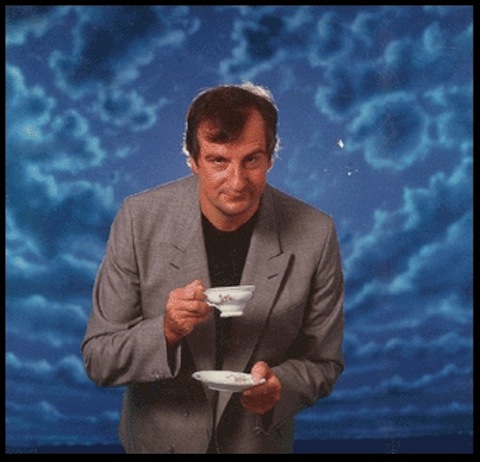
Next to my bed lies George Orwell’s Essays, the bricklike Everyman’s Library edition of the 1984 author’s thoughts on ideology, colonialism, the abuse of language, crime and punishment, and just what constitutes a nice cup of tea. The astute essayist keeps his mind prepared to go anywhere, and Orwell’s rigorous love of simple English pleasures places him especially well to write on the subject of how best to prepare a serving of “one of the main stays of civilization in this country, as well as in Eire, Australia and New Zealand.” His essay “A Nice Cup of Tea,” which first ran in the Evening Standard of January 12, 1946, breaks the process down into eleven points, from “One should use Indian or Ceylonese tea” to “One should take the teapot to the kettle and not the other way about” to, finally, “Tea — unless one is drinking it in the Russian style — should be drunk without sugar.” These guidelines may sound to us a tad austere at worst, but Orwell presents some of them as downright “controversial.” Dare he so boldly insist upon drinking only out of a “good breakfast cup,” de-creaming milk before pouring it into tea, and never, ever using strainers nor bags?

He does indeed. History has remembered Orwell as one of authoritarianism’s most outspoken enemies, but clearly he had moments, especially when it came to his beverage of choice, where he himself would brook no dissent. Decades later, a much more easygoing writer would make his own contribution to the literature of English tea procedure: A short piece by Hitchhiker’s Guide to the Galaxy author Douglas Adams suggests that you “go to Marks and Spencer and buy a packet of Earl Grey tea” (this may, depending upon your location, require an overseas trip), that “the water has to be boiling (not boiled) when it hits the tea leaves,” and that “it’s probably best to put some milk into the bottom of the cup before you pour in the tea,” since “if you pour milk into a cup of hot tea you will scald the milk.” Though we here at Open Culture have made no secret of our interest in coffee, how could we turn down a cup of tea made to the standards of such well-respected men of letters?
via BoingBoing
Related Content:
10 Golden Rules for Making the Perfect Cup of Tea (1941)
Epic Tea Time with Alan Rickman
Colin Marshall hosts and produces Notebook on Cities and Culture and writes essays on literature, film, cities, Asia, and aesthetics. He’s at work on a book about Los Angeles, A Los Angeles Primer. Follow him on Twitter at @colinmarshall.


next to your bed LIES
Keeping in mind that Douglas Adams spent the last years of his life in Santa Barbara, California, it meant an overseas trip for him, too.
They’re entitled to their half-assed opinions. Milk in the tea. Blech. Earl Grey? Kid stuff.
Can’t anybody get anything right? Putting the milk in the cup first will result in scalded milk. Milk after, when one can see what one’s doing.
And please do have some sugar if you like.
Don’t listen to those two blokes, I’M mother.
The “milk in first” is, I’m led to believe, for drinking tea from china. It was believed that pouring boiling water in to china would crack it (and it was expensive in those days). Nothing to do with scalding the milk (it would work both ways, surely?)
If using a tea pot I tend to put milk in first, though it risks the tea being too milky.
If using a tea bag, milk afterwards, always, as the water needs to be boiling.
For americans: boiling = boiling, not “very hot”. And you take the tea bag out after brewing, don’t leave it in.
But green tea: let the water cool first.
Earl Grey: just chuck it in the bin and get some proper tea.
Orwell was a literary genius: but putting the milk in last … ?
Ye GODS
I prefer the tea plain.
Earl Grey?? Is he kidding?! A vile concoction. Why in heaven’s name would you want bergamot in your tea?
What I would really like to learn about is all the English Brands of Tea frim yesteryear like whay are some of the Brand Names of the Teas Orwell would have drank if he had the cash in hand at the time to buy good tea
This is one of my favorite examples of Orwell trivia.
I remember, that in Highschool we had a text by Orwell for English listening comprehension. It was him going on about how utterly inappropriate it was to have sugar or milk in tea, because “tea is bitter and should be drunken bitter”.
Somehow this stuck in my memory. Many years later, at university, I read Orwell’s “Homage to Catalonia”, in which he complains about the fact that his wife could not find dried milk and sugar to send to the front, where he served in the International Brigades. So that he had to take his tea without milk or sugar.
Don’t get me wrong. I adore his writing, I visited his grave several times when I was living in the area but I do find it a little amusing that he was first whining about first-world problems whilst sitting in a trench (so very British: less concerned about being shot than having a proper cuppa!), and later turned it around to claim that only the really tough and sophisticated people drink tea the “right” way. ;-)